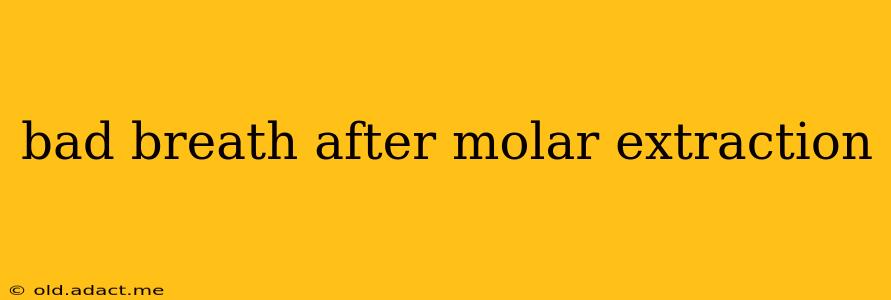Bad breath, or halitosis, is a common concern after a molar extraction. While it's often temporary, understanding the causes and implementing effective solutions can significantly improve your comfort and speed up recovery. This post explores the reasons behind post-extraction bad breath, offers practical solutions, and addresses frequently asked questions.
Why Does My Breath Smell Bad After a Tooth Extraction?
Several factors contribute to bad breath following molar extraction:
- Blood and Tissue Debris: The extraction site is a wound, and the initial healing process involves blood clotting and the breakdown of tissue. This process can release unpleasant odors. Proper cleaning and following your dentist's instructions are crucial for minimizing this.
- Food Particles: The extraction site can trap food particles, especially in the initial days of healing. These trapped particles decompose, leading to a foul odor. Gentle rinsing and meticulous brushing (once the extraction site is healed enough) help prevent this.
- Infection: In some cases, infection can develop at the extraction site. This is a serious complication, and a noticeable bad smell could be a warning sign. Seek immediate dental attention if you suspect an infection. Signs beyond bad breath might include pain, swelling, fever, or pus.
- Dry Socket: Dry socket (alveolar osteitis) is a painful complication where the blood clot at the extraction site dislodges prematurely. This exposes the bone, resulting in a particularly unpleasant odor, along with significant pain. Your dentist can treat a dry socket.
- Oral Hygiene: Poor oral hygiene practices, even before the extraction, can exacerbate bad breath post-surgery. Bacteria thrive in a less-than-clean mouth, contributing to halitosis.
How Long Does Bad Breath Last After Tooth Extraction?
The duration of bad breath varies, depending on the individual and the healing process. Generally, it should subside within a week or two as the extraction site heals. However, persistent bad breath beyond two weeks warrants a visit to your dentist to rule out complications.
How Can I Get Rid of Bad Breath After a Tooth Extraction?
Several strategies can help manage bad breath post-extraction:
- Gentle Rinsing: Your dentist will likely provide instructions on rinsing your mouth. Typically, this involves using a saltwater rinse several times a day. This helps to clean the area and promote healing. Avoid forceful rinsing or spitting, as this can dislodge the blood clot.
- Maintain Oral Hygiene: Once your dentist gives the okay, gently brush and floss your teeth, being careful around the extraction site. This helps prevent the buildup of food particles and bacteria.
- Eat a Balanced Diet: A healthy diet plays a role in overall oral health. Avoid foods that are known to cause bad breath, such as onions and garlic.
- Stay Hydrated: Drinking plenty of water helps to wash away food particles and keeps your mouth moist, reducing the risk of bad breath.
- Avoid Smoking: Smoking significantly impedes healing and can exacerbate bad breath. Quitting smoking is beneficial for your overall health and faster healing.
What If My Bad Breath is Persistent?
Persistent bad breath after a molar extraction could indicate an infection or dry socket. Contact your dentist immediately if:
- Your bad breath lasts longer than two weeks.
- You experience significant pain, swelling, or fever.
- You notice pus or other discharge from the extraction site.
Can I Use Mouthwash After a Tooth Extraction?
Using mouthwash after a tooth extraction requires caution. Some mouthwashes contain alcohol, which can irritate the extraction site and delay healing. Always check with your dentist before using any mouthwash. A saltwater rinse is generally a safe and effective alternative.
Is Bad Breath After Tooth Extraction a Sign of Infection?
While bad breath itself isn't definitive proof of infection, it can be a symptom, particularly when accompanied by other signs such as pain, swelling, or fever. If you're concerned, consult your dentist immediately.
By understanding the causes and following these tips, you can minimize bad breath and promote a smoother recovery after your molar extraction. Remember, consulting your dentist is crucial for addressing any persistent concerns.
